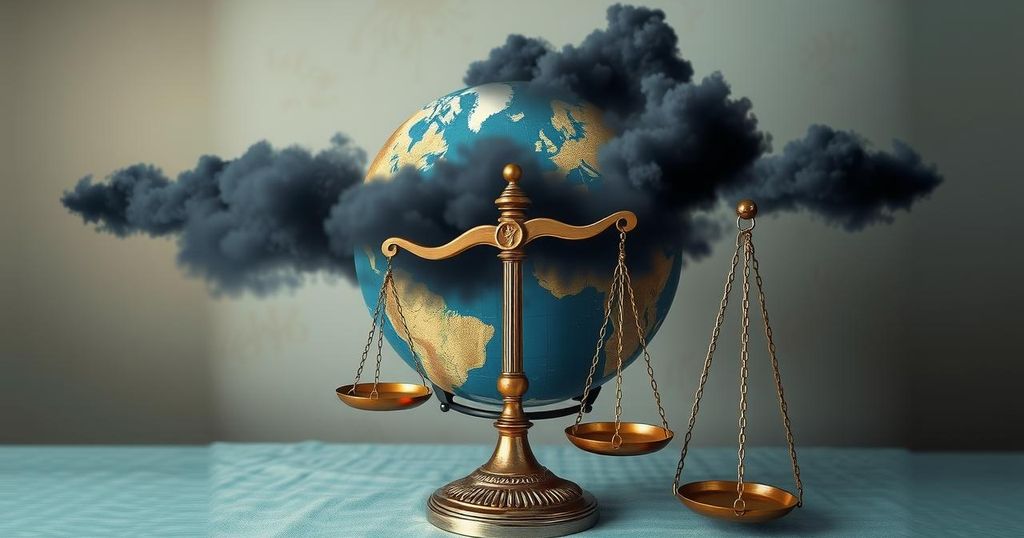The DRC has called for UN sanctions against Rwanda, alleging a declaration of war due to increased troop deployments supporting the M23 rebel group advancing towards Goma. With escalating violence resulting in peacekeeper deaths, the UN Secretary-General has urged Rwanda to withdraw its forces. Tensions have prompted both nations to recall diplomats amidst failed peace talks, emphasizing the urgent need for stability in the region.
The Democratic Republic of Congo (DRC) has formally requested the United Nations to impose sanctions against Rwanda, accusing it of an act of war by dispatching additional troops across the border. Kinshasa claims these reinforcements are joining the Rwandan-backed M23 militia, which is advancing towards Goma, the capital city of North Kivu province. The M23 already received significant support from Rwandan military forces, exacerbating tensions in an increasingly volatile region.
Recent clashes have resulted in the deaths of approximately a dozen foreign peacekeepers, prompting UN Secretary-General Antonio Guterres to demand that Rwanda withdraw its troops from the DRC. During an emergency meeting of the UN Security Council, Congolese Foreign Minister Therese Kayikwamba stressed that the influx of Rwandan soldiers constitutes a blatant violation of DRC’s national sovereignty, labeling it a “declaration of war.”
Intelligence reports indicate that between 500 and 1,000 Rwandan soldiers crossed into the DRC to reinforce the M23. Kayikwamba appealed for the UN to implement targeted sanctions, including asset freezes and travel bans on Rwandan officials, in response to these hostile actions. Tensions have escalated, resulting in both nations recalling their diplomats amidst failed peace talks between their leaders.
The situation in Goma has deteriorated, with heavy fighting reported and considerable civilian displacement occurring, as a Rwandan drone reportedly struck DRC locations. The African Union and United States joined in the growing calls for an immediate ceasefire, emphasizing the need for dialogue and diplomatic solutions. Guterres called for an end to hostilities and for both the M23 and Rwanda to cease military actions immediately.
A UN report has previously indicated that Rwanda has been exploiting the M23 conflict to gain access to DRC’s mineral resources. Kayikwamba has also urged the UN Security Council to impose a comprehensive embargo on Rwandan mineral exports, particularly gold. Meanwhile, tensions continue to rise, as both nations have withdrawn their diplomatic missions amidst fears of further conflict.
The DRC has faced continuous violence from various armed groups for over three decades, particularly in the eastern regions where the M23 operates. The UN peacekeeping mission, MONUSCO, plays a crucial role in stabilizing the country, although it has recently reported casualties among its personnel. Following increasing violence, the UN has initiated the evacuation of non-essential staff from Goma to ensure safety.
In summary, the DRC’s call for UN sanctions against Rwanda amidst escalating conflict underscores the fragile state of peace in the region. The involvement of international actors and the push for accountability within the UN Security Council may influence the trajectory of this ongoing crisis.
For over three decades, the eastern Democratic Republic of Congo has experienced persistent conflict fueled by rival armed groups and militia activity. The M23, or March 23 Movement, previously gained control over Goma in 2012 but was defeated in 2013, only to regroup later. With Rwanda alleged to be leveraging the M23 for its own gains in natural resources, relations between the DRC and Rwanda have significantly deteriorated, particularly following the breakdown of peace negotiations.
The DRC’s urgent appeal to the UN for sanctions against Rwanda reflects a growing international concern regarding stability in the region. With calls for an immediate ceasefire amid rising hostilities, it is evident that the situation requires immediate international intervention and dialogue to prevent further deterioration of peace in the DRC.
Original Source: www.citizentribune.com






